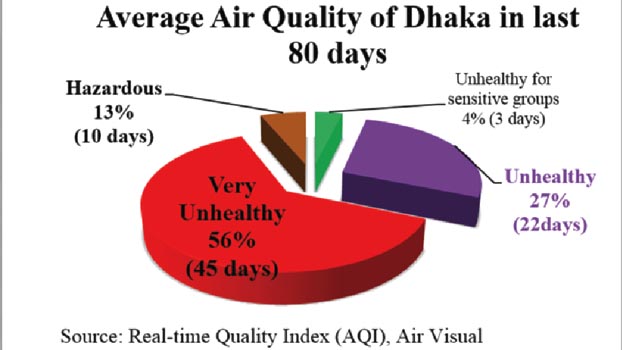Measures to check dust pollution
Govt to purchase modern sweeping machines for DSCC and DNCC

In the wake of the recent increase in air and dust pollution, the government is going to take special measures to save the city dwellers from the harmful impact of the pollution in the capital. As part of the move, the local government ministry has planned to purchase about 47 sweeping machines for the two city corporations in Dhaka -- 34 for Dhaka South City Corporation (DSCC) and 13 for Dhaka North City Corporation (DNCC), sources said.
Besides, the ministry has directed all authorities concerned to take strict action against the persons or entities that are creating dust pollution. According to Air Quality Index (AQI), Dhaka’s air quality remains worse during the dry season mainly in the months between December and March due to air and dust pollution.
Analysing Dhaka’s AQI in the last 80 days, it was observed that Dhaka’s air quality was ‘very unhealthy’ in 56 percent of the days, ‘unhealthy’ in 27 percent, ‘unhealthy for sensitive groups’ in 4 percent, and ‘hazardous’ in 13 percent of the days. The AQI ranking suggests that the citizens of Dhaka did not enjoy good or even moderate air for a single moment during the period.
On Friday morning, Dhaka ranked the second worst in AQI among all the countries in the world with AQI value of 240. Earlier, on 17 and 23 November, 26 December, 6, 29 and 31 January and 9, 14, 18 and 19 February, Dhaka topped the list. The city has been continuously staying among the five most polluted cities around the world.
The AQI is a tool for measuring daily air quality of any city or country. It refers to the degree of pollution or cleanliness of the air. The higher AQI score refers to the higher degrees of pollution. An AQI score between 101 and 150 indicates ‘unhealthy for sensitive groups’ while AQI score between 151 and 200 refers to ‘unhealthy air for all people’. AQI score between 201 and 300 indicates the air is ‘very unhealthy’ while a value over 300 indicates the air is ‘hazardous (highly dangerous) with possible serious health complications’.
In Bangladesh, the AQI is based on five criteria pollutants including Particulate Matter (PM10 and PM2.5), NO2, CO, SO2 and Ozone (O3). For the pollutants, the Department of Environment (DoE) has set national ambient air quality standards, which aims to protect against adverse human health impacts.
Dhaka has long been facing a number of environmental pollutions including that of air. DoE on November 20 issued a public warning notice on air pollution when Dhaka ranked the worst in AQI for the past several days. Public notice of DoE stated that the particle matters coming from road dust and soil dust, vehicles, burning of biomass, and orthodox brick kilns around and inside the capital are responsible for air pollution in Dhaka.
While visiting different areas in Dhaka city, this correspondent found that dust spreads from different development activities and construction sites, including metro rail works and unplanned road digging, contributing to serious air pollution. Besides, construction materials like sand, cement and bricks lying on roadsides and at building construction sites are also producing huge dust.
Recently, an inter-ministerial meeting was held with an aim to protect the environment in the capital. Observers at the meeting said that it takes too much time to dig or repair roads and to complete any kind of construction work in the city. In this situation, citizens are facing health hazards while using roads. From the meeting, the local government ministry has been directed to complete construction works as early as possible.
The local ministry has also directed all city corporations to take immediate action to completely stop air and dust pollution in the dry season to protect the environment and the citizens from health hazards. According to sources, the two city corporations of Dhaka have taken necessary measures to stop the traditional process of road sweeping upon the directive of the local government ministry.
Meanwhile, the DNCC has already purchased two sweeping machines to prevent air pollution. Besides, the corporation will purchase two big and three small sweeping machines with their own fund. Apart from this, it will also purchase three machines financed by the World Bank and six machines financed by the government.
The average price of each big sweeping machine has been estimated at Tk 4.95 crore and each small machine at Tk 3.87 crore. On the other hand, the DSCC has planned to purchase 34 sweeping machines -- 24 big and 10 small. The corporation has already sent a Development Proposal Plan (DPP) to purchase nine machines.
In addition, it will purchase 10 machines from mechanical division. The rest will be purchased from different projects. Of these, the cost of the big machines has been estimated at Tk 6 crore small ones at Tk 3.5-4 crore. About purchasing machines, DSCC Chief Waste Management Officer Air Commodore Md Zahid Hossain said, “The amount of dust on roads has increased during the dry season. The project has been undertaken to protect the citizens from the dust pollution initially.”
“The project proposal for purchasing nine sweeping machines has been sent to the DPP. We will start tender process after getting approval,” he added. Local Government and Rural Development (LGRD) Minister Md Tajul Islam recently said, “The air pollution of Dhaka has increased due to digging activities of different service providing organizations.”
“WASA, DESCO and TITAS are digging roads to set up water, electricity and gas lines. The government has taken steps to purchase 20 modern sweeping machines to reduce this pollution,” he added.




